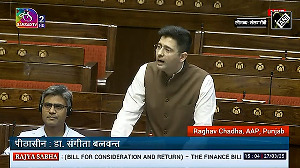Starting out as a marketing executive for an oil company, Ian Livingstone eventually made a business out of his hobby - gaming. Though he is 57 years old now, he remains an avid gamer, but his obvious passion lies in designing games. He tells that to design you need to have a vivid imagination and UK's free-thinking culture allows creativity to flourish.
He started Games Workshop way back in 1975 with a friend, Steve Jackson, and is now the creative director of Eidos - UK's leading developer and publisher of video games. In fact, he created Lara Croft Tomb Raider, which was then made into a film starring Angelina Jolie in the lead. His role-playing gamebooks have been hugely popular and over the years he has sold 15 million copies in over 26 languages.
What are gamebooks? Do they help children in any way?
Gamebooks aren't like normal novels. They help stimulate a child's imagination. Readers play roles and then the game becomes their own personal adventure/fantasy.
Take, for instance, a situation, which is described as this: "You are walking down a dungeon and you see a skeleton monster walking towards you. There is a door on your left which takes you somewhere else."
Now the reader has a choice to enter a door, by going over to page 86. If the reader decides to fight the monster, he can go to page 67. The reader makes choices, which impact the way the adventure unfolds in a gamebook.
These role playing gamebooks were at their peak in the 1980s and in the late 1990s; after computer games took over, they went out of print. Puffin used to import them into India in the eighties.
Now these books are coming back and there is renewed interest in them. People who read these books as children are now buying them for their children. The age profile of readers today has changed from 9-11 in the earlier days to 11-13 year-olds now.
We get letters from kids with suggestions for the kind of monsters we should create. Some even create their own adventures and send them to us. The scale of this return of gamebooks though is nothing like it was in the 1980s, when it was the only kind of interactive entertainment available.
These books involve the reader far more than regular books. Children solve puzzles, problems and learn about choices and the consequence thereof.
Board games were big at one time. What would you say contributed to their decline?
It's a similar story as the gamebooks. The arrival of video games restricted the board games market. Also, people don't have that much time today as they once did. There is no time for five-six players to sit for hours and finish a board game. My home has a room for a collection of over 1,000 board games.
What is your agenda in India? We hear you are looking for a publisher for gamebooks in India. Any luck?
I am here on a fact-finding mission for my company. I am also part of British Council's Spread The Word series. There is creative talent in India but right now it's only being used for outsourced art and animation. I am looking to produce complete games here, not just parts. China is way ahead of India in gaming with studios that do complete production, not just art and animation.
There is also an opportunity for gamebooks here. There isn't a huge console game market and virtually no retail presence for games here as yet, so books might do well.
That's why I am looking for a publisher in India for the Fighting Fantasy role-playing interactive gamebook series. We have spoken to three publishers - Penguin, Scholastic and East West - all of whom have expressed keen interest.
Video games are maligned for the high-level of violence in it. Your comments.
Only about 5 per cent of games have graphic violence in them. If violence is in context, it is okay. Most games today are age-rated. It is up to schools and parents to keep away inappropriate games from children instead of blaming the games.






 © 2025
© 2025